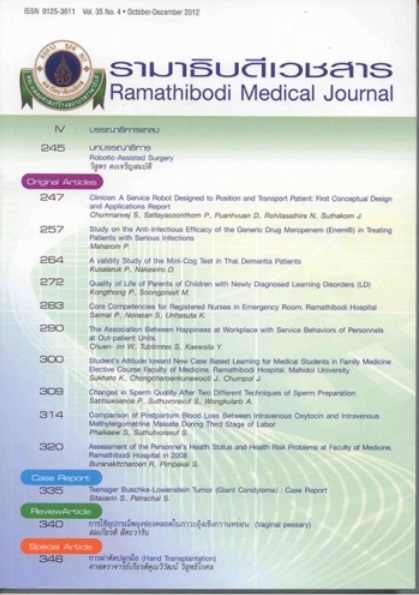Core Competencies for Registered Nurses in Emergency Room, Ramathibodi Hospital
Main Article Content
Abstract
Objectives: The study the core competency for registered nurses in emergency room, Ramathibodi hospital in trauma care.
Method: This descriptive research included the sample of 43 registered nurses. Subjected were asked to self-evaluate their competency levels using a questionnaire. The questionnaire was modified by Krongdai Unhasuta and Thai Trauma Nurse Network. The reliability was obtained by means of Cronbach’s alpha coefficient, which gave a value of 0.98. The data were analyzed in terms of frequency, mean, percentage, Standard deviation and Spearman rank correlation coefficient.
Results: The results of study showed that the total means score of ability base and practice outcome on core competency for registered nurses in trauma care were high level. The ability base on core competency in each aspect found that the cooperation aspect has highest means score and the lowest was problem-solving aspect. The ability base and practice outcome of core competency in the overall had been shown a positively significant correlation at the .01 and .05 levels. No statistically significant correlation was found between the ability base of competency in the cooperation aspect and practice outcome of competency in the decision making aspect.
Conclusions: The ability base on core competency for registered nurses in trauma care was high level. Suggestion the head nurse uses the result this study for participate evaluation to decrease weakness point such as the problem solving, decision making and technical knowledge that there was lowest score level will played attention to develop the first priority and sustain the strengthening point.
Article Details
References
Unhasuta K, Trauma Nurses Network of Thailand. Trauma Care Management in ER. Bangkok, BangPhlat: SD Avenue Hotel; 2011. (in Thai).
Benner P. From novice to expert: Excellence and Power in Clinical Nursing Practice. Menlo Park, CA: Addison‐Wesley; 1984.
Krannasoot P. Statistics for Behavioral Science Research. 3rd ed. Bangkok: Chulalongkorn Printing; 1999. (in Thai).
Misomnai C. Organizational behavior in Seminar in Human Resource Management, unit 6. Nonthaburi: School of Management Sciences, Sukhothai Thammathirat Open University; 2004. (in Thai).
Naknaen M, Unhasuta K. Core competencies for registered nurses in emergency room, Udon Thani hospital, 2009. Available from: https://www.thaitraumanurse.com/download/article/2009/Document/competency of Emergency Room_Nurses in KBH.pdf.
Dangsuwan K, Boonyoung N, Apichato A. Core competencies of accident and emergency nurses as perceived by nurses in hospitals under the Ministry of Public Health in the three southern border provinces. Songklanagarind Medical Journal. 2008;26(3):227-237.
Thaweephon C. Core competencies for registered nurses in emergency room, Phra Samut Chedi Sawatyanon hospital, 2009. Available from: https://www.thaitraumanurse.com/download/article/2009/Document/ competency of Emergency Room_Nurses in KBH.pdf.
Simms LM, Price SA, Ervine NE. The Professional Practice of Nursing Administration. New York: John Wiley & Sons; 1985.
Spitzer LR. Nursing Management Desk Reference: Concepts, Skills and Strategies. Philadelphia, W.B.: Saunders; 1994.
Jaroensrimuang S. Selected Factors and Competencies of Perioperative Nurses in Regional Hospitals. Available from: https://library.cmu.ac.th/digital_collection/etheses/fulltext.php?id=7933&word=%CA%D4%C3%D4%C3%D1%A1%C9%EC&check_field=AUTHOR&select_study=&condition=2&search=9&philosophy=&master=#.
